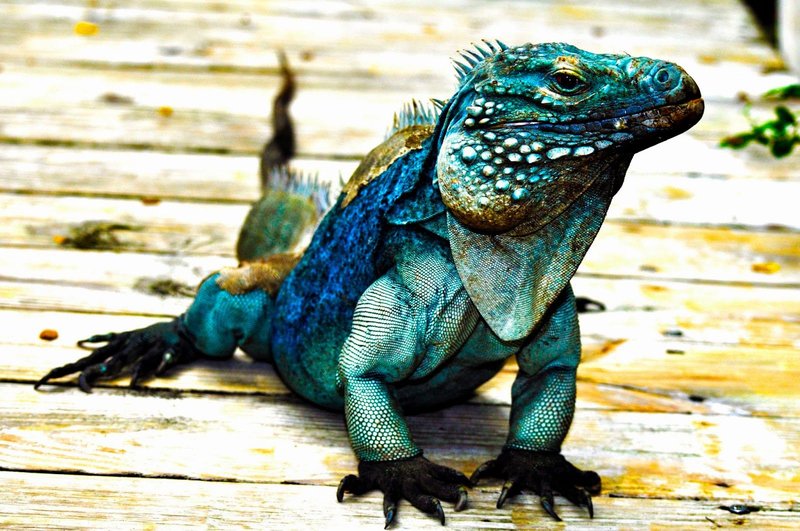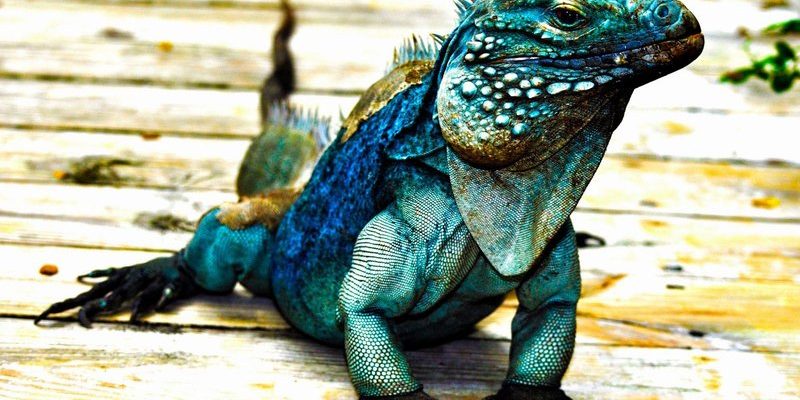
Honestly, the relationship between humans and blue iguanas can be quite fascinating. Much like a dog might greet you at the door with excitement, you may wonder if your blue iguana will show any signs of recognition when you enter the room. In this article, we’re going to dive deep into the world of blue iguanas to uncover how they interact with their human companions. So grab your favorite drink, and let’s explore!
Understanding Blue Iguanas’ Social Behavior
Blue iguanas, native to the Grand Cayman Islands, are social reptiles. Unlike many reptiles that prefer solitude, these creatures have a somewhat social nature. But what does this mean for their ability to recognize their owners? Here’s the thing: recognition in animals can come in various forms, and while blue iguanas might not wag a tail or purr, they still have ways of acknowledging familiar faces.
When we look at the social interactions of blue iguanas, we see that they can become accustomed to the routines and the presence of their owners. Over time, a well-cared-for blue iguana may begin to associate their owner with food, safety, and shelter. They might bask more comfortably in your presence or show signs of curiosity when you approach. This familiarity can create a sense of recognition, even if it’s not the same as what you’d see in more traditionally affectionate pets.
Body Language Matters
Just like humans express feelings through body language, reptiles do the same, albeit in their own unique ways. A blue iguana that recognizes you might show different behaviors when you enter the room. Here are a few signs to look for:
- Head bobbing: This can be a sign of curiosity or acknowledgment.
- Tail movements: A gentle swish or a more vigorous movement might indicate they’re excited to see you.
- Positioning: If they turn to face you or come closer, it could mean they recognize you.
The key takeaway is that while their forms of recognition might not be as overt as a dog’s tail wag, blue iguanas have their own ways of communicating their familiarity.
Do Blue Iguanas Form Bonds with Their Owners?
You might be wondering if blue iguanas can form bonds, similar to dogs or cats. While they may not express love in the same way, they can develop a relationship based on trust and familiarity. If you’ve had your blue iguana for a while and they feel safe around you, it’s likely that they’ve formed a bond.
Trust is essential for these iguanas. If you handle them gently and consistently, they’ll start associating you with positive experiences. You’ll often find that your blue iguana responds better to you, especially if you bring them their favorite treats, like leafy greens or fruits. Over time, this can create a bond of mutual trust. A well-socialized iguana may even show curiosity and excitement when you approach.
Creating a Safe Environment
One of the best ways to encourage recognition and bonding is by providing a stable and safe environment. Here are a few tips:
- Consistent habitat: Keep their living environment clean, stable, and warm.
- Routine feeding: Feed them at the same time each day to create a schedule they can learn.
- Gentle handling: Spend time interacting with them daily, even if it’s just observing them in their habitat.
If they feel safe and secure, they’re more likely to recognize you and engage with you positively.
The Science Behind Recognition
You might be curious about how recognition works on a scientific level. Studies in animal behavior suggest that reptiles like blue iguanas have a different brain structure compared to mammals, which affects how they perceive and interact with their environment. Unlike mammals, reptiles don’t have the same emotional processing abilities. However, this doesn’t mean they can’t remember or recognize their owners.
Research indicates that blue iguanas can form long-term memories, which play a role in their ability to recognize familiar faces. They tend to rely more on visual cues and less on olfactory (smell-based) cues compared to other species. This means that your blue iguana can learn to identify your distinctive features over time.
Memory and Recognition in Reptiles
The memory in blue iguanas works somewhat like a puzzle. They piece together experiences, sights, and perhaps even the sounds of their owners. Consider this: if you always sing the same tune or talk softly when feeding them, those auditory cues can also become part of their recognition process.
- Visual Memory: They remember shapes, colors, and sizes, helping them differentiate between people.
- Associative Learning: This is how they connect specific individuals with experiences, such as being fed.
So, while they might not jump up and down when you walk in the room, they do have the capability of recognizing you through a combination of visual memory and learned associations.
Common Misconceptions About Iguanas and Recognition
With all this talk about recognition, let’s clear up some common misconceptions. Many people assume that iguanas are indifferent pets, only focused on survival. While it’s true they don’t express affection in the same way as dogs, this doesn’t mean they’re incapable of recognizing their owners.
Another misconception is that iguanas only latch onto their owners for food. While food plays a big role, social interactions and consistent handling also significantly impact recognition. If your blue iguana only sees you when it’s time to eat, they might recognize you, but the bond won’t be as strong compared to if you spent time with them outside of feeding.
Debunking the Indifference Myth
You might see a blue iguana lounging in its habitat seemingly oblivious to the world around it, but don’t be fooled. They might be observing everything quietly. When you approach them, they could be calculating their next move based on your past interactions. In a way, they’re like introverts at a party—taking their time to warm up but definitely aware of what’s happening.
So do blue iguanas recognize their owners? The answer is yes, they can indeed recognize you, but perhaps not in the way dogs or cats do. Their recognition comes from a mix of visual cues and learned associations over time. They may show signs of familiarity and even bond with you, especially if you create a safe and stable environment for them.
As you build this relationship, remember that patience is key. Like any friendship, it takes time to develop. If you take the time to understand your blue iguana and provide consistent care, you may find that your relationship blossoms in ways you didn’t expect. Just like any good friendship, it’s built on trust, respect, and, of course, the occasional treat!

